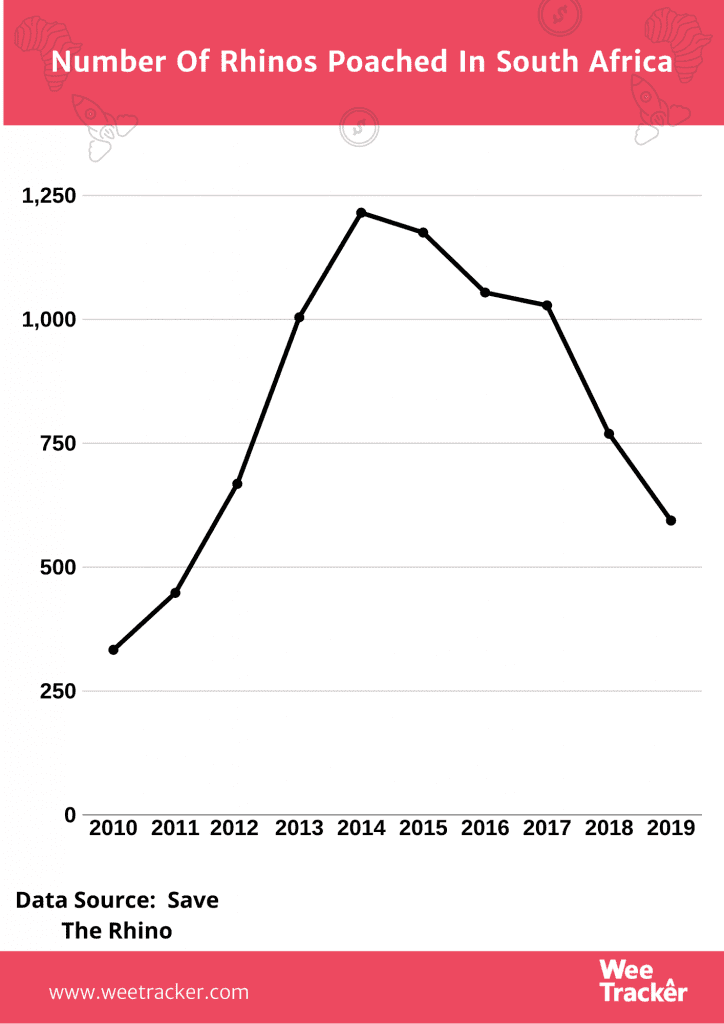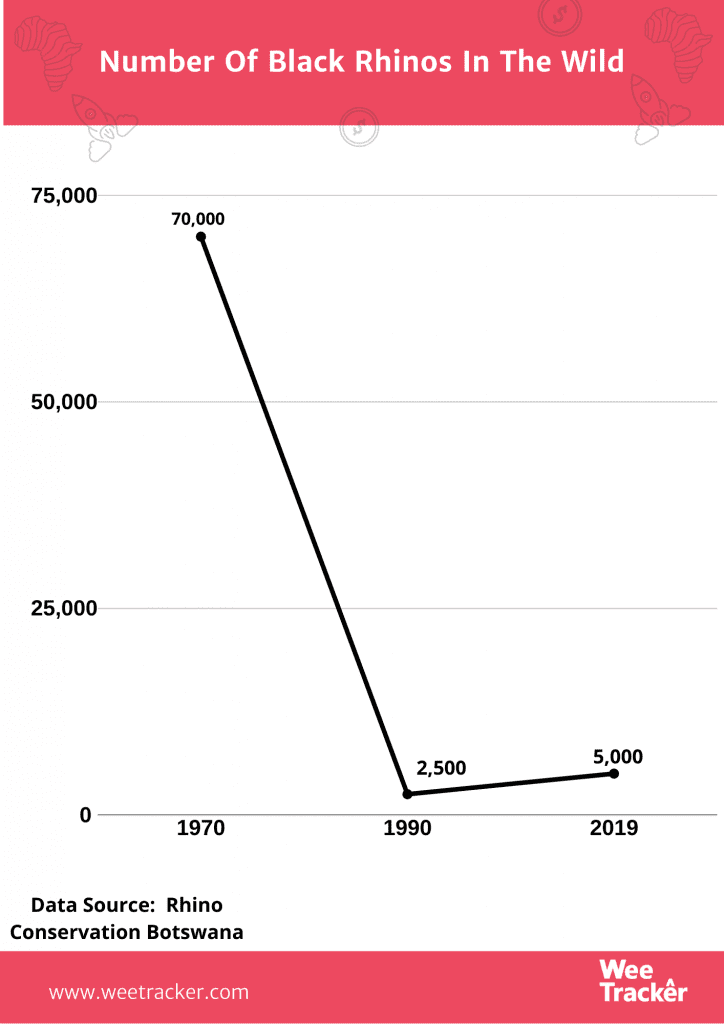Coronavirus Presents Africa’s Precious Wildlife With A Familiar Death Sentence

Tourism is Africa’s new gold, and the continent’s world-renowned wildlife are the carriers of that treasure. With the outbreak of coronavirus came the general shutdown of tourist centers, international flights and national borders.
The region’s tourism is now at a worrying all-time low, but there’s an even bigger problem that threatening the industry in and out of a global pandemic.
Shots Re-fired
One of the reasons Southern Africa is the epicenter of tourism in the continent is the presence of a diversity of wildlife that cannot be found elsewhere. But now, the very creatures that attract droves of tourists from within and outside the continent are at the mercy of a familiar problem.
Thanks to the lockdowns instituted to slow/stop the spread of the novel virus, poachers have an opportunity to resume their nefarious hunting activities.
More so, they are capitalizing on the scarcity of people, patrol teams and enforcement officers—most of whom are observing self-isolation—to once again pursue their illegal activities.
In Botswana—Africa’s best safari country—6 rhinos have been gunned down since the nation imposed the closure of its borders. The country’s military claims to have killed 5 suspected poachers in the space of 4 days during anti-poaching operations at Okavango in April.
It is no news that rhino skins and tusks are in high demand. Their illegal trade offers a promising business opportunity to poachers who are yet unable to meet the surging demands from Asian countries, chief of which is China. There, a kilogram of rhino tusk can sell for as much as USD 60 K.
Almost 50 of the species have been slaughtered in the landlocked country in the past 10 months, as the southern African wildlife have reported a surge in poaching of the endangered species. More frustrating is that some conservationists can’t be present in the countries due to emergency visa restrictions.
In South Africa
South Africa accounts for 93 percent of Africa’s estimated 20,000 white rhinos and 39 percent of the remaining 5,000 are critically endangered black rhinos. But these animals are far from safe, especially now that 7 deaths have occured since the nation’s national lockdown.
Rhino 911, a South African emergency service for rhinos, was called on March 25th, 2020, to rescue a 2-month-old white rhino calf whose mother was reportedly brought down by poachers. On March 26th, two black rhinos were called in for rescue, but their horns were already hacked off, leading to their death.
The South African Department of Environment, Forestry and Fisheries says that 594 rhinos were poached in 2019, though it is progress compared to the 769 were slaughtered in the year before. 2019 was the fifth year in a row that poaching numbers have declined in South Africa, since numbers peaked at 1,215 in 2014.
In South Africa, poachers kill an average of three rhinos per day—or about 100 per month—to feed the demand for horn on the black market. Nearly two-thirds of rhinos poached in the country in 2014 were killed in Kruger National Park.
Rhino horn is one of the most valuable natural commodities on earth, worth more than gold. Such a demand drives record poaching rates, especially now that nations are on lockdown and business is not as usual. Nevertheless. scientific studies have proved that rhino horn has no medical properties. Therefore it is of no use to anyone except the rhino.
African Wildlife: The Other Problem
While rhinos are being targeted for their horns, African wildlife in general is not spared the effects of the coronavirus pandemic. The outbreak is posing a challenge to the protection of iconic species as key wildlife parks go without a single tourist.
Large mammals, especially lions, are the leading attractions, pulling big crowds of European, American and Asian tourists to Africa with good revenue generation to respective safari destination countries within the continent.
But now, in safari destinations like Kenya and Tanzania, wildlife conservations parks are posed with a huge challenge. Animal protecting depends on tourist revenue, but as tourism is on hold, the sources of those funds are threatened.
There is reason to believe that tourism will not pick up in the continent until the mid stages of 2021. This means going more than a year without revenue from tourism and dealing with the reality of unemployment.
With African governments trying to borrow to augment their public health spending, conversationalists are worried the continent’s wildlife may not get the financial attention it needs to survive the pandemic.
As tourism infrastructure are likely to deteriorate, so will wildlife spots should investments not be made to battle challenges like poaching and the destruction of favorable habitats. Tourism jobs are being lost on a large scale. As a result of lesser income, insiders, including rangers, might be tempted to poach animals to make some bucks.
Since 2008, a small number of ranch owners, hunters, game capture operators, pilots and vets have become involved in poaching.
Tourism On A Costly Holiday
Even though the WHO has said Africa is the least Covid-19-affected area globally, the economic effects are plentiful. The continent’s overnight, hotel bookings have since been canceled, safaris are postponed and cultural tours remain abandoned.
All looked good for tourism at the start of 2020. Africa had the world’s fastest-growing tourism industry, one that is projected to bring in billions of dollars.
But the mighty, fell hand of Covid-19 drastically turned things round. Lockdowns in a lethal combination with a tiny local tourism customer base and an industry targeting high-paying foreigners has offered the region’s tourism a situation it is not prepared to handle.
There is no telling how tourism-based business will survive since they are mostly dependent on international visitors. No one is also certain when borders will be opened again and when international flights would be released from their necessary grounding.
However, in South Africa, the Department of Tourism is offering eligible small-, micro- and medium-sized enterprises to apply for a share of the ZAR 200 Mn (USD 10.6 Mn) Tourism Relief Fund
Much of Africa’s tourism growth was expected to benefit the wildlife economy, paying for park management, community conservation, and jobs for 23 million Africans—many of whom dwell in wildlife rich rural areas. Wildlife forms the foundation of Africa’s natural ecosystems. Wildlife-based tourism employs 9.3 million Africans directly and indirectly.
Photo by Danny Wage Via Unsplash.

